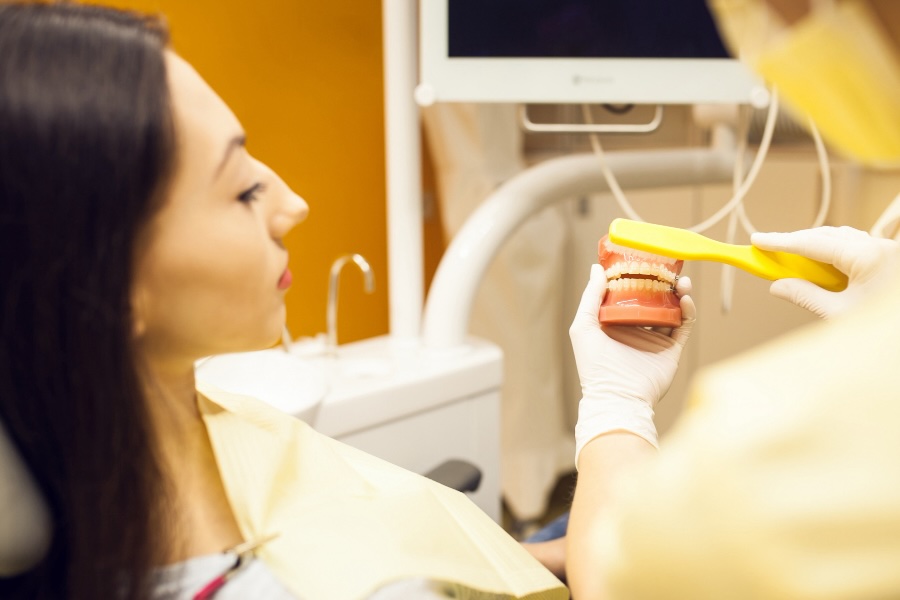Wisdom tooth extraction may be recommended when the wisdom teeth are causing pain, discomfort, decay, jaw problems, gum swelling, teeth misalignment, or other dental issues. If you’re unsure whether removal is necessary, review the common signs you may need your wisdom teeth removed. The surgery process differs depending on the difficulty of the treatment. Some wisdom teeth may be buried deeper into the bone than others and may make retrieval more difficult.
But aside from the surgery itself, the recovery process is just as important. Understanding how long wisdom teeth recovery takes can help you prepare, ensuring a smoother, faster, and optimal healing experience. This article breaks down what to expect during recovery and provides tips for a comfortable healing journey.
What to Expect Immediately After Wisdom Teeth Removal
The recovery journey for wisdom teeth removal begins as soon as your dentist dismisses you from the dental chair. You should take note of the specific guidelines for post-surgical care to prevent complications down the road.
Common Symptoms After Wisdom Tooth Extraction
Immediately after your wisdom teeth are removed, you will experience some common symptoms that should be normal post-surgery. These include mild to moderate discomfort, swelling around the extraction site, some bleeding from the surgical area, bruising around the jaw, and difficulty opening the mouth.

Initial Recovery Steps
Some tips that can help improve comfort and relieve immediate symptoms after your surgery are:
- Apply pressure on the wound – Bite on a gauze and apply steady pressure on the extraction site to control bleeding. Change the gauze as needed.
- Use ice packs – This can help with the swelling. Apply directly on the cheek for 15-20 minutes at a time.
- Take the prescribed medications – Pain relievers and antibiotics are commonly prescribed after surgery. Your dentist may also prescribe drugs to control excessive bleeding if necessary.
- Rest – Take it east for the first 24 hours and allow your body to naturally recover.
- Avoid strenuous activities – Lifting heavy and tiring workouts can dislodge the healing blood clots and restart bleeding.
Typical Recovery Timeline
Recovery after wisdom tooth removal varies for everyone. But, here’s a general guideline that can help you understand what to expect over the course of a month:
First 24 – 48 Hours
Most of the discomfort should be experienced during the first couple of days. Ice packs and pain relievers will be your go-to for a more comfortable recovery experience. A blood clot will form over the extraction site. This is rich in nutrients and is important during healing. Avoid disturbing the clot to prevent complications such as dry socket. With that, you should stick to a liquid to semi-soft diet and avoid using straws.
Days 3 – 5
Swelling usually peaks on the third day following wisdom tooth removal. Use ice packs to reduce the swelling. Bruising may also be more noticeable as your mouth continues to heal. This should decrease as the days go by. You may start transitioning to soft foods but they still should be easy to chew. Keep good oral hygiene. You may use an antibacterial mouthwash or a saltwater rinse to wash away food debris stuck around the extraction site.
Week 1
By the end of the first week, most of the swelling should subside and pain should be significantly reduced. You should return to your dentist so they can remove any remaining stitches and check your healing progress. You can also start reintroducing solid foods in your diet. Overall, most people should be able to go back to their daily lives a week after surgery.
Weeks 2 – 3
At this time, the gums will continue to heal. You can resume brushing your teeth as you normally would. But it is important to stick to your dietary limitations, which include avoiding hard or crunchy foods as this may disrupt your progress.
1 Month and Beyond
After a month, the extraction site should be mostly healed. Although, complete wound closure is not expected until a few months. Eating should be back to normal. Continue to monitor lingering pain or signs of infection and contact your dentist should there be any.

Factors Influencing Recovery
Everyone’s wisdom tooth recovery journey is unique and this can be due to the several factors that may impact how long the extraction area heals.
Age
Younger patients tend to heal faster than older individuals due to better regenerative capabilities. This is why wisdom tooth recovery can be easier to the younger age group.
Health Conditions
If you are suffering from medical conditions such as diabetes or clotting diseases, a slower healing process can be expected. The same way goes for those with existing oral health problems, such as gum disease, as it contributes to bacteria count in the mouth that may impede recovery.
Difficulty of Extraction
The harder the surgery, the longer the recovery. Simple tooth extractions heal faster than complicated surgeries.
Post-Surgery Care
Following your dentist’s advice closely can significantly influence how quickly you recover. Doing otherwise can cause complications that may lengthen your recovery time.
Tips for Faster and Smoother Recovery
To ensure a smooth and easy journey to better oral health, here are some tips that you can take note of:
Managing Pain and Swelling
Discomfort can be managed with pain relievers and cold compress. Use as prescribed and indicated by your dentist.
Oral Hygiene
Good oral hygiene prevents build-up of bacteria that can infect the wound. Be gentle with brushing and floss as you usually would. But, avoid the extraction site for a few days to prevent irritating your gums. Instead, rinse with warm salt water to disinfect the mouth.
Dietary Guidelines
Be mindful of your diet. Eat a well-balanced, nutritious meal that should include soft foods for the first few days following your surgery. Avoid hard, crunchy, sticky, and hot foods and drinks.
Rest and Activity
Rest helps your body recover properly after your surgery. Keep activity to a minimum at least within a week after your wisdom tooth removal.
Conclusion
In summary, wisdom teeth recovery generally takes a few weeks. But, everyone’s experience is different. Following your dentist’s aftercare instructions is key to ensuring a smooth recovery and minimizing complications that can affect the outcomes of treatment.
Whether it is understanding the typical recovery timeline or knowing about possible complications, staying informed can help you feel more confident as you recover.
If you have any concerns about your wisdom teeth or need expert advice, book a visit with Sierra Dental today.